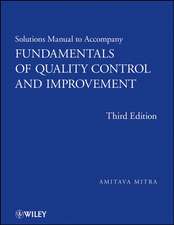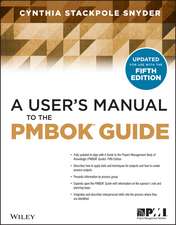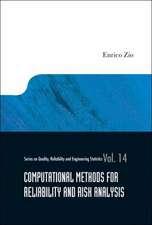Vulnerable Systems
Autor Wolfgang Kröger, Enrico Zioen Limba Engleză Paperback – 6 sep 2014
Vulnerable Systems reflects the current state of knowledge on the procedures which are being put forward for the risk and vulnerability analysis of critical infrastructures. Classical methods of reliability and risk analysis, as well as new paradigms based on network and systems theory, including simulation, are considered in a dynamic and holistic way.
Readers of Vulnerable Systems will benefit from its structured presentation of the current knowledge base on this subject. It will enable graduate students, researchers and safety and risk analysts to understand the methods suitable for different phases of analysis and to identify their criticalities in application.
| Toate formatele și edițiile | Preț | Express |
|---|---|---|
| Paperback (1) | 636.63 lei 6-8 săpt. | |
| SPRINGER LONDON – 6 sep 2014 | 636.63 lei 6-8 săpt. | |
| Hardback (1) | 640.88 lei 6-8 săpt. | |
| SPRINGER LONDON – 24 iun 2011 | 640.88 lei 6-8 săpt. |
Preț: 636.63 lei
Preț vechi: 748.97 lei
-15% Nou
Puncte Express: 955
Preț estimativ în valută:
121.82€ • 127.19$ • 100.82£
121.82€ • 127.19$ • 100.82£
Carte tipărită la comandă
Livrare economică 05-19 aprilie
Preluare comenzi: 021 569.72.76
Specificații
ISBN-13: 9781447158462
ISBN-10: 1447158466
Pagini: 220
Ilustrații: XIV, 204 p.
Dimensiuni: 155 x 235 x 12 mm
Greutate: 0.31 kg
Ediția:2011
Editura: SPRINGER LONDON
Colecția Springer
Locul publicării:London, United Kingdom
ISBN-10: 1447158466
Pagini: 220
Ilustrații: XIV, 204 p.
Dimensiuni: 155 x 235 x 12 mm
Greutate: 0.31 kg
Ediția:2011
Editura: SPRINGER LONDON
Colecția Springer
Locul publicării:London, United Kingdom
Public țintă
ResearchCuprins
1. Introduction and Definition of Key Terms.- 2. Properties of Critical Infrastructures.- 3. Challenges to Methods for the Vulnerability Analysis of Critical Infrastructures.- 4. Basic Approaches.- 5. Conceptual Frameworks for Vulnerability Assessment.- 6. Methods of Analysis.- 7. Concluding Considerations.
Notă biografică
Prof. Dr. Wolfgang Kröger works in the Mechanical and Process Engineering Department at ETH Zurich, Switzerland.
Enrico Zio (BS in Nuclear Engineering, Politecnico di Milano, 1991; MSc in Mechanical Engineering, UCLA, 1995; PhD in Nuclear Engineering, Politecnico di Milano, 1995; PhD in Nuclear Engineering, MIT, 1998) is Director of the Chair in Complex Systems and the Energetic Challenge of Ecole Centrale Paris and Supelec, full professor of Reliability, Safety and Risk Analysis at Politecnico di Milano, Rector’s delegate for the Alumni Association of the Politecnico di Milano, adjunct professor in Risk Analysis at the University of Stavanger, Norway and at Universidad Santa Maria, Chile, and invited lecturer and committee member at various Masters and PhD programs in Italy and elsewhere. He is the past Director of the Graduate School of the Politecnico di Milano
He is the current Chairman of the European Safety and Reliability Association (ESRA), which he has previously served as Vice-Chairman (2000-2005).
He has also served as Editor-in-Chief of the international journal Risk, Decision and Policy (2003-2004) and is a member of the Korean Nuclear Society and China Prognostics and Health Management Society.
He is a member of the editorial boards of the international scientific journals Reliability Engineering and System Safety, Journal of Risk and Reliability, Journal of Performability Engineering, Journal of Science and Technology of Nuclear Installations, plus a number of others in the reliability, safety and nuclear energy fields.
Enrico Zio (BS in Nuclear Engineering, Politecnico di Milano, 1991; MSc in Mechanical Engineering, UCLA, 1995; PhD in Nuclear Engineering, Politecnico di Milano, 1995; PhD in Nuclear Engineering, MIT, 1998) is Director of the Chair in Complex Systems and the Energetic Challenge of Ecole Centrale Paris and Supelec, full professor of Reliability, Safety and Risk Analysis at Politecnico di Milano, Rector’s delegate for the Alumni Association of the Politecnico di Milano, adjunct professor in Risk Analysis at the University of Stavanger, Norway and at Universidad Santa Maria, Chile, and invited lecturer and committee member at various Masters and PhD programs in Italy and elsewhere. He is the past Director of the Graduate School of the Politecnico di Milano
He is the current Chairman of the European Safety and Reliability Association (ESRA), which he has previously served as Vice-Chairman (2000-2005).
He has also served as Editor-in-Chief of the international journal Risk, Decision and Policy (2003-2004) and is a member of the Korean Nuclear Society and China Prognostics and Health Management Society.
He is a member of the editorial boards of the international scientific journals Reliability Engineering and System Safety, Journal of Risk and Reliability, Journal of Performability Engineering, Journal of Science and Technology of Nuclear Installations, plus a number of others in the reliability, safety and nuclear energy fields.
Textul de pe ultima copertă
The safe management of the complex distributed systems and critical infrastructures which constitute the backbone of modern industry and society entails identifying and quantifying their vulnerabilities to design adequate protection, mitigation, and emergency action against failure. In practice, there is no fail-safe solution to such problems and various frameworks are being proposed to effectively integrate different methods of complex systems analysis in a problem-driven approach to their solution.
Vulnerable Systems reflects the current state of knowledge on the procedures which are being put forward for the risk and vulnerability analysis of critical infrastructures. Classical methods of reliability and risk analysis, as well as new paradigms based on network and systems theory, including simulation, are considered in a dynamic and holistic way.
Readers of Vulnerable Systems will benefit from its structured presentation of the current knowledge base on this subject. It will enable graduate students, researchers and safety and risk analysts to understand the methods suitable for different phases of analysis and to identify their criticalities in application.
Vulnerable Systems reflects the current state of knowledge on the procedures which are being put forward for the risk and vulnerability analysis of critical infrastructures. Classical methods of reliability and risk analysis, as well as new paradigms based on network and systems theory, including simulation, are considered in a dynamic and holistic way.
Readers of Vulnerable Systems will benefit from its structured presentation of the current knowledge base on this subject. It will enable graduate students, researchers and safety and risk analysts to understand the methods suitable for different phases of analysis and to identify their criticalities in application.
Caracteristici
Discusses new paradigms for reliability and risk analysis Provides current research on risk and vulnerability analysis of critical infrastructures Written by experts on vulnerable systems










